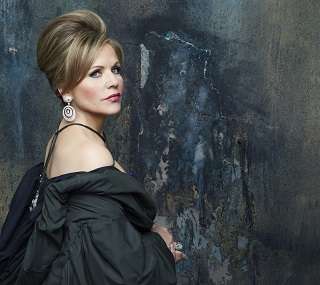|
Back
America’s Soprano Still Sings! Palm Beach
Kravis Center for the Performing Arts
01/01/2022 -
George Frideric Handel: Alexander Balus, HWV 65: “Calm thou my Soul” – Semele, HWV 58: “Endless Pleasure”
Gabriel Fauré: Les Berceaux, Op. 23 No. 1 – Au bord de l’eau, Op. 8 No. 1
Edvard Grieg: Sechs Lieder, Op. 48: 3. “Lauf der Welt & 5. “Zur Rosenzeit”
Erich Wolfgang Korngold: Die tote Stadt, Op. 12: “Marietta’s Lied”
Ruggero Leoncavallo: La bohème: “Musette svaria sulla bocca viva”
Francesco Cilea: Adriana Lecouvreur: “Io son l’umile ancella”
Maria Schneider: Selections from Winter Morning Walks
Richard Rodgers: The Sound of Music
Harry Warren: You’ll Never Know
Andrew Lippa: The Diva
Renée Fleming (soprano), Gerald Martin Moore (pianist)

R. Fleming (© Andrew Eccles/Decca)
Long touted through her celebrated career as “America’s Soprano,” Renée Fleming’s most memorable role was arguably the Marschallin in Richard Strauss’s bittersweet comedy of manners Der Rosenkavalier. A sagacious princess of 38 in the world of the opera, the Marschallin has resigned herself to the passage of time and its consequences for holding onto love. Fleming is a bit older (she turns 63 this year, a number I mention only for comparative purposes), but she, too, had a moment of resignation. In 2017, just before she embarked on her last run of Rosenkavaliers at New York’s Metropolitan Opera, Fleming announced that she would step back from her singing career before decline set in. Ever since, her stage appearances have been rare, and she has admirably pursued opportunities in arts administration, consulting, directing, and the science behind the wellness of singing.
These are all worthy avenues of endeavor. But listening to her in this intimate recital five years after her semi-retirement, one can only wonder if she left too soon. The voice is fully intact, with its signature rich middle register perfectly capable of ascending to sweetened high notes and descending into an effective lower register. The program ranged far and wide, encompassing early music, high Romanticism, verismo, expressionism, Golden Age Hollywood musicals, and contemporary music. Granted, we heard nothing from Strauss, the difficult Verdi roles Fleming took earlier in her career, or her other signature role – the title part in Dvorák’s Rusalka – but the immense range of her talent was on full display and remains undiminished.
Fleming opened with two Handel selections – “Calm thou my Soul” and “Endless Pleasure.” She conserves a mastery of the coloratura runs and delicious melismas memorable from her early career and delivered them with nearly girlish allure. A brace of Fauré songs – “Les Berceaux” and “Au bord de l’eau” – challenged her with a deluge of artful naturalism, and here, too, she was in top form. Moving along in the dreamy realm of the Romantic, her radiant approach to Edvard Grieg’s “Lauf der Welt” and “Zur Rosenzeit” – songs set to poems by Uhland and Goethe – perfectly captured the enthusiasms and disappointments of young romance. “Lauf der Welt,” or “Way of the World,” anticipated the Marschallin’s musings about the unfair nature of love explored in Strauss’s Rosenkavalier. The song’s depiction of a chance romantic encounter with an undefined dimension of consent – “I don’t ask, she doesn’t say yes/But she doesn’t say no, either” go the lyrics – also merited a commendably tongue-in-cheek “trigger warning,” which Fleming announced by observing that times have changed along with mores. The implication was that we probably should not take the new Puritanical definitions of expressed consent too seriously and just enjoy the art. Marietta’s meditation on love and death from Korngold’s opera Die tote Stadt also captured her expressive gifts.
The second half of the program featured an even wider array of repertoire. “Musette svaria sulla bocca viva,” from Leoncavallo’s much less famous version of La bohème, was lively and artful, even if it offered little hope that the opera could ever replace Puccini’s much better known version. The more familiar soprano set piece from Cilea’s Adriana Lecouvreur – “Io son l’umile ancella,” a rare admission that a star performer is merely a servant to art – came off less well, with some muddy notes, but was worth including. Contemporary songs from Maria Schneider’s Winter Morning Walks are settings of poems by the one-time U.S. Poet Laureate Ted Kooser, a cancer sufferer whose condition forced him to take morning walks before the sun rose. Fleming delivered his musings with an aching simplicity anchored in hope – Kooser survived his illness, recovered fully, and remains alive today at the age of 82.
Broadway enjoyed a prominent place in Fleming’ s embrace of the title number from The Sound of Music, here sung beautifully enough to make one forget how corny the musical truly is. Harry Warren and Al Dubin’s You’ll Never Know gave bluesy edge to the recital, reminding us that Fleming has done as well in that genre as in opera. Andrew Lippa’s The Diva offered an amusing description of the typical singer’s life, even if hearing about budgets and mortgages dissipated some of the mystique.
Fleming encored with a gorgeous rendition of “O mio babbino caro,” the famous aria from Puccini’s short opera Gianni Schicchi. A mainstay of sopranos, it would be difficult to imagine a performer before the public today who could sing the aria better. As the applause continued, a second encore, of “I Could Have Danced All Night” from Lerner and Loewe’s My Fair Lady, added to the concert’s intimate mood when Fleming invited the audience to sing along. Few declined, and the palpable excitement should serve as a clarion call for her to return to the stage at the earliest opportunity.
Paul du Quenoy
|